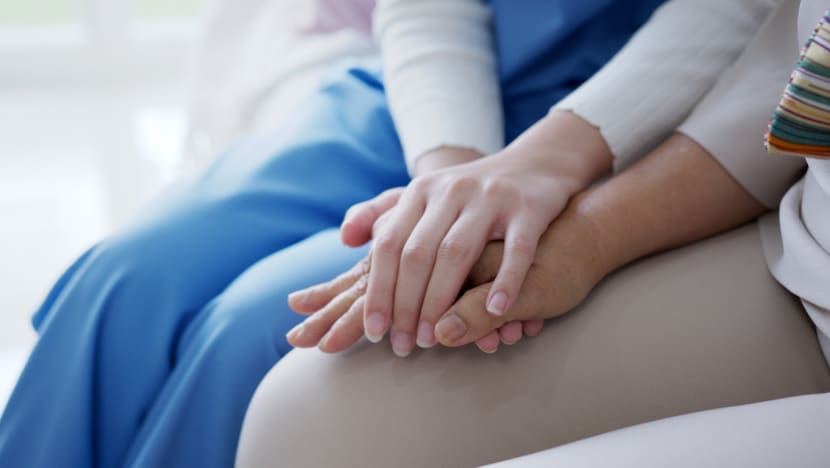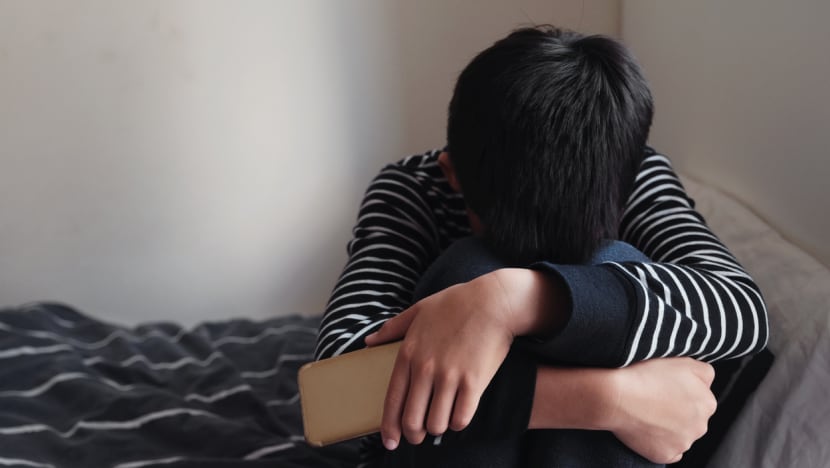Commentary: How many of those with mental health conditions were caregivers themselves?
We often call for more empathy for those with mental health conditions, but what about their caregivers? Who’s there to care for them, asks former NMP and mental health advocate Anthea Ong.

More people in Singapore were willing to seek help for mental health issues in 2022. (Photo: iStock/Chaay_Tee)
SINGAPORE: In June, a woman wearing a skincare face mask was captured on a livestream kicking a couple’s food.
The Jun 28 incident, originally streamed live on the Twitch platform, spread like wildfire on social media. One TikTok recut of the livestream garnered more than 1.5 million views. That was just one recut. There were multiple other videos; some TikTok users went so far as to add their own commentary and insulting words in their videos.
The online comments appeared as fiercely as the videos spread: Some netizens showed support for the livestreamer, calling the masked woman names like "siao" (crazy); others called for empathy given her state of mind.
Yet no one thought to consider the struggles of the woman’s family. After the incident went viral, the woman’s sister, who is her primary caregiver, contacted CNA. The sister revealed that the 41-year-old woman is being treated for schizophrenia and spoke about the struggles caregivers face in caring for someone with a mental health condition.
It is estimated that there are more than 430,000 adults in Singapore with common mental health disorders, according to a release in October 2021 by the Institute of Mental Health (IMH).
Additionally, one in 116 people aged 18 years and above of the resident population in Singapore have been diagnosed with schizophrenia at some point in their lives, according to a separate IMH release in May 2021.
This translates to about 34,000 persons living with this mental disorder like the woman, which also means there are at least 34,000 caregivers like the woman’s sister.
COVID-19 has invited more conversations about mental health. We often call for more empathy for those with mental health conditions but is it time we also call for empathy and for even more to be done for their caregivers?

WHEN CARERS BURN OUT, WHO CARES FOR THEM?
In the first Singapore national study by Singapore Management University on mental health caregivers in 2020, more than 72 per cent said caring for a person with mental health issues makes them tired and exhausted. Three in four also expressed a need for temporary separation from the person they care for.
Families are the mainstay of caregiving for persons with mental health conditions in Singapore; institutionalisation and/or professional home-based services are not common nor easily available.
The family caregiver takes care of the day-to-day needs of the care recipient, monitoring their mental state, identifying early signs of illness, relapse and deterioration, and helping them in accessing services. The family caregiver also supervises treatment and provides emotional support, even if domestic help is available.
Emotional caregiving can’t be outsourced. I have seen first-hand the mental, emotional and physical toll that taking care of my nephew who lives with mental health challenges has taken on my brother and sister-in-law. And more than a few caregivers I personally know have suffered burnout and spiralled into depression.

A study in the US estimated that 20 per cent of family caregivers suffer from depression. To be clear, caregiving does not cause depression, nor will everyone who provides care experience the negative feelings that go with depression.
But in an effort to provide the best possible care for a family member or friend, caregivers often sacrifice their own physical and emotional needs, and the emotional and physical experiences involved with providing care can strain even the most capable person. The resulting feelings of anger, anxiety, sadness, isolation, exhaustion — and then guilt for having these feelings — can exact a heavy toll.
The SG Mental Wellbeing Network was recently launched as our mental health efforts go upstream and preventive, but are we also considering how caregiver burden contributes to our mental health challenge? How many of those with mental health conditions might have been caregivers themselves?
NATIONAL CAREGIVING CHALLENGE, MENTAL HEALTH CHALLENGE - OR BOTH?
In Singapore, much policy attention has been given to the burden of elderly caregiving as we grapple with a rapidly ageing population. It was estimated in 2021 that there were at least 210,000 of such caregivers, with about 70 per cent of them aged 40 and above.
However, the dominant narrative of caregiving for the elderly and dementia needs to expand to include caregivers of persons with mental health conditions and those with disabilities.
Given an estimate of 3.1 per cent prevalence of disabilities among Singapore residents, and that the 12-month prevalence for any mental disorder was estimated to be 6.5 per cent prior to COVID-19, we can only imagine that the total number of caregivers is much higher than 210,000 persons.
The National Council of Social Service (NCSS) recently released the results of its 2018 Quality of Life (QoL) of Caregivers study, which surveyed 4,513 caregivers in Singapore, of which 25 per cent were caregivers of persons with mental health conditions.
An important finding in this survey was that while caregivers who had help reported a higher quality of life, about 37 per cent of caregivers were caring for their loved ones alone.
Those who were doing it solo cited the lack of availability of help as a factor. They were also more likely to be females, those aged 50 and above, single, spouses of their care recipient, caregivers of persons with mental health conditions, caregivers of adult care recipients, living in smaller households, and of lower socioeconomic statuses.
But is help the same across the board for all caregivers? For example, studies have found that caregiver burden scores in the caregivers of psychiatric patients were significantly higher than that of chronic medical illness.
WHAT MORE CAN BE DONE TO ENSURE CAREGIVERS ARE WELL-SUPPORTED?
We need a multi-pronged approach towards creating an ecosystem for caregiving, especially for caregivers of persons with mental health conditions.
First, the right training and support structures need to be offered to all caregivers. Caregiving training is important not only because it equips caregivers with skills to help perform daily tasks with their care recipients, but also, skills to practise self-compassion and self-care amidst the demands of providing care to others.
If we are serious about addressing our mental health challenge and viewing caregiving as part of our national duty, home-based caregiving training should be further subsidised and scaled up, fast.
Second, we need to increase greater awareness and accessibility of services targeted towards caregivers. In the NCSS QoL survey, some caregivers reported not getting additional help due to the lack of financial ability or knowledge of such services.
Targeted resources for different types of caregivers could, for example, be made available and more visible within the community through local clinics. Caregiver support offices may also be sited at polyclinics.
Third, long-term (for example, trained domestic helpers) and short-term (for example, respite services) professional caregiving services need to be escalated and scaled up. However, not everyone in Singapore would be able to afford such services. If priced too high, the option is closed off, especially to those who marginally miss out on means-testing. A possible solution would be to allow MediSave and MediFund to pay for these services.
Fourth, strengthening our caregiving ecosystem also involves supportive policies in the workplace. More flexible work arrangements can be offered by employers, along with support programmes centred on the well-being of caregivers that would also benefit overall productivity and performance. For example, social movement Hush TeaBar has been engaged by such progressive employers to provide mental respite sessions specially for their caregiver employees.
We should also expand childcare leave to family care leave to better reflect the needs of caregiving as a society, if we do not wish to see more people leave the labour force to care for their loved ones. According to the Ministry of Manpower, 10.9 per cent of women and 3.2 per cent of men in 2018 indicated that they were not working due to caregiving responsibilities for families/relatives.
Finally, we should normalise and collectively embrace caregiving - not as the burden of a few, but a responsibility of all.
In April this year, WIN Caregivers Network, the first support network for caregivers of people with mental health issues, was launched by the The People's Association Women's Integration Network Council and Women's Executive Committees (WEC), Caregivers Alliance Limited and NCSS. The network enables caregivers to connect and share experiences, and equip them with knowledge on managing mental health conditions.
Community groups and platforms like SG Assist - which matches volunteers with people in need, and also runs a call centre - also make sure that help is always available.
Caregiving affects all of us, it is a responsibility that no one should shoulder alone.
In the case of the masked woman in the viral video, her sister told CNA that the incident boils down to a lack of empathy. A person with mental illness doesn’t deserve such public shaming, they are “someone’s child, someone’s sister, someone’s family member.”
Indeed, that someone is most probably a caregiver - and it could be you one day.
Anthea Ong is a former Nominated Member of Parliament, a professional certified coach, a social entrepreneur (SG Mental Health Matters, A Good Space, WorkWell Leaders, Hush TeaBar) and the author of 50 Shades of Love.
Where to get help:
National mental health helpline: 1771
Samaritans of Singapore Hotline: 1767
Singapore Association for Mental Health Helpline: 1800 283 7019
You can also find a list of international helplines here. If someone you know is at immediate risk, call 24-hour emergency medical services.




























